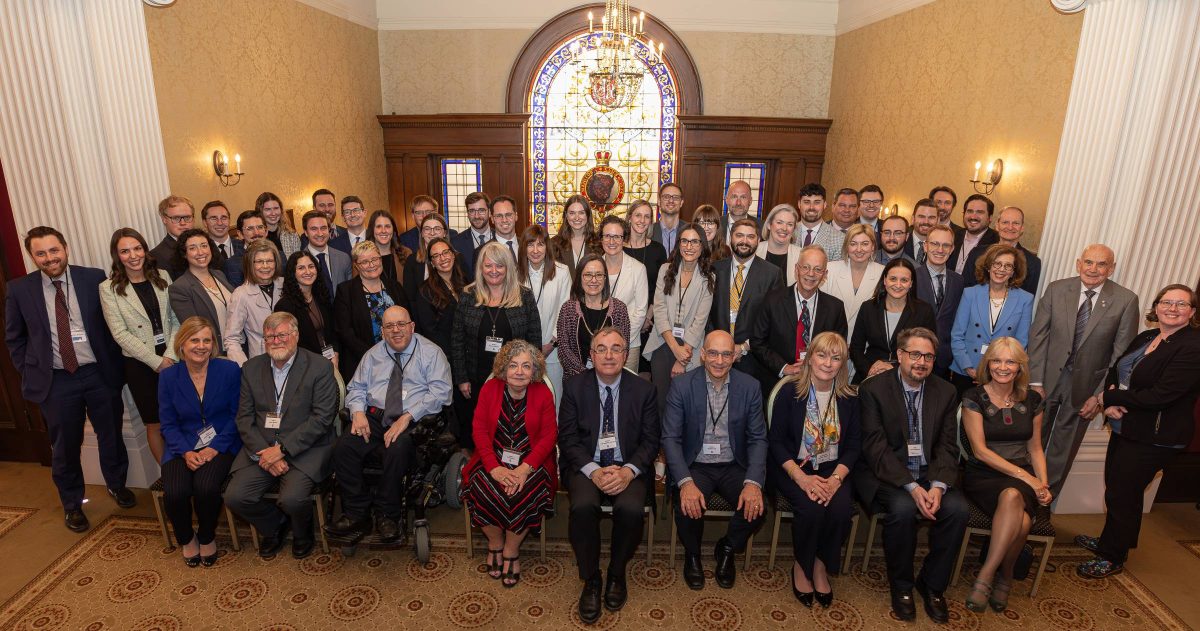
Judges and their former clerks from the past 20 years of the Faculty of Law’s Manitoba Court of Appeal clerkship program gathered for a reunion on May 10, 2024. Photo by Mike Latschislaw.
Celebrating 20 years of the Manitoba Court of Appeal clerkship program
Collaboration between courts and law school offers invaluable student experience
Twenty years ago, a young professor at the University of Manitoba’s Faculty of Law approached the Dean with an idea: to ask the Manitoba Court of Appeal to take on third-year law students as clerks to gain hands-on experience in seeing how the province’s top court operates. As the 20th fall term of the program approaches, the Faculty and the Court realized the impact of the program’s long-lasting legacy and summoned alumni of the program from far and wide to celebrate at a luncheon held on May 10th, 2024.
Professor Darcy MacPherson had been teaching law at Robson Hall for two years in 2004, and fresh memories of his own experience clerking at the Nova Scotia courts in Halifax while a law student at Dalhousie, inspired him to approach Dean Harvey Secter, [BComm/67, LLB/92], about starting a similar program in Manitoba. Secter took the matter to The Honourable Justice Freda M. Steel who led the Manitoba Court of Appeal’s participation in the program.
Today, with Justice Steel’s retirement, The Honourable Justices Christopher Mainella and David Kroft are responsible for the program, while Elizabeth McCandless, the Faculty of Law’s Director of Clinics, oversees the Clerkship Program as one of the Externships now offered by the law school. MacPherson is still involved as a lead supervising faculty member of the Clerkship Program.
Since 2004, 68 student clerks have successfully completed the program. In 2009 – 2010, the number of clerks accepted into the program annually was increased from two to four. In 2020, the course was converted from three to six credit hours, and starting in 2024, it has been turned into an Externship lasting from September to April, garnering 12 credit hours.
At the May 10th event, remarks were given by event host, The Honourable Chief Justice Marianne Rivoalen, Justice Mainella, Dr. Richard Jochelson, Dean of Law, and MacPherson, who reminisced on how the idea of starting a clerkship program at Robson Hall became a reality.
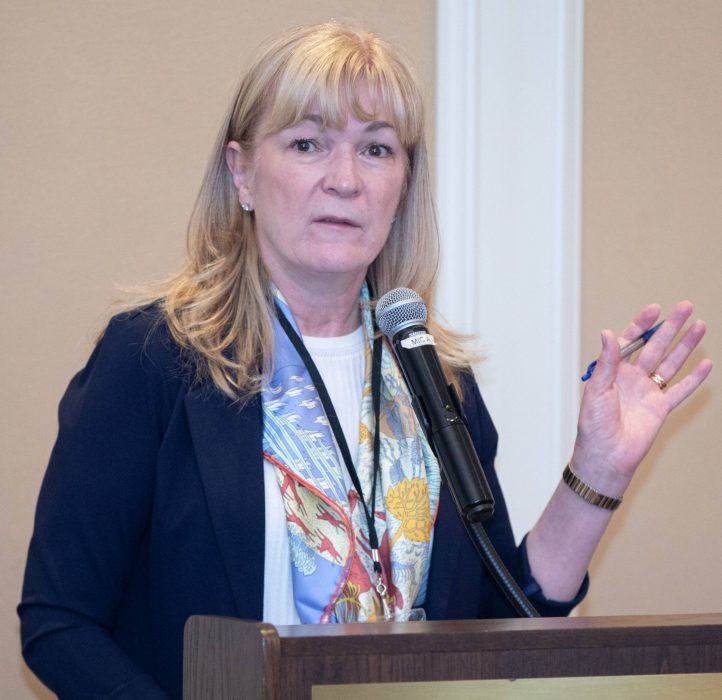
The Honourable Marianne Rivoalen, Chief Justice of the Manitoba Court of Appeal. Photo by Mike Latschislaw.
“The judiciary has long played a part in legal education well before the common law was taught in universities,” said Justice Mainella in his address to the alumni attending the event. “The Court of Appeal views the coordination of the clerkship program with Robson Hall as essential to the development of high caliber lawyers on which our system of justice relies.”
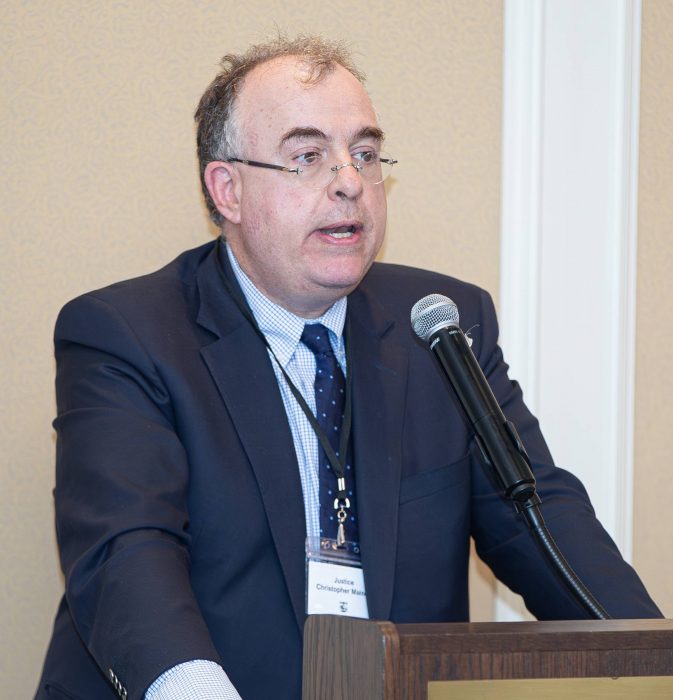
The Honourable Justice Christopher J. Mainella, Manitoba Court of Appeal. Photo by Mike Latschislaw.
Justice Mainella highlighted the theme of tradition, but also shared news of the future of the program: “I am excited to say that the clerkship program will evolve this coming fall to become a double credit externship. Law students will continue to do legal research for the Court of Appeal and also assist individual judges in their day-to-day work.
“Justice Kroft and I who are responsible for the clerkship program, together with Melanie Bueckert, a researcher with the Court, would like to thank Dean Jochelson, Professor MacPherson and all of the faculty and staff at Robson Hall on behalf of all the members of the Court of Appeal for making this expansion of the clerkship program possible. We are all looking forward to it.”
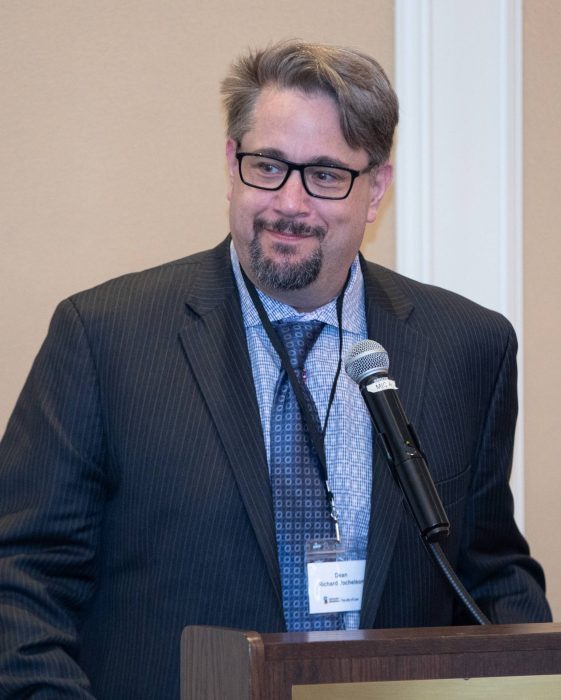
Dr. Richard Jochelson, Dean of the Faculty of Law, University of Manitoba. Photo by Mike Latschislaw.
“Celebrating 20 years of unparalleled partnership between the Manitoba Court of Appeal and the University of Manitoba Faculty of Law, we reflect on the profound impact our clerkship program has had on shaping the legal minds of tomorrow,” said Jochelson. “This collaboration has provided our students with invaluable hands-on experience and a peek behind the curtain of the administration of justice. Here’s to two decades of mutual growth, learning, and excellence in legal education.”
Said MacPherson: “This took a lot of people saying ‘Yes’ to get it started, and a wonderful level of commitment from the Court to continue its success. But, it is also important to remember that the quality of the students who have come to the Court, and their ability to contribute to the work of the Court and to learn from some of the best legal minds in the Province that makes this all work.”
Bueckert, in conversation with the recently retired Honourable Justice Freda Steel and the Faculty of Law, joked about being “hard done by” since she graduated from the Faculty of Law in 2003, missing out on participating in the Clerkship Program by one year. Hired by the Court in 2006, she has acted in the capacity of supervising lawyer of the student clerks since 2007, initially with Justice Steel, and now with Justices Mainella and Kroft who have taken over from Steel as Supervising judges of the program.
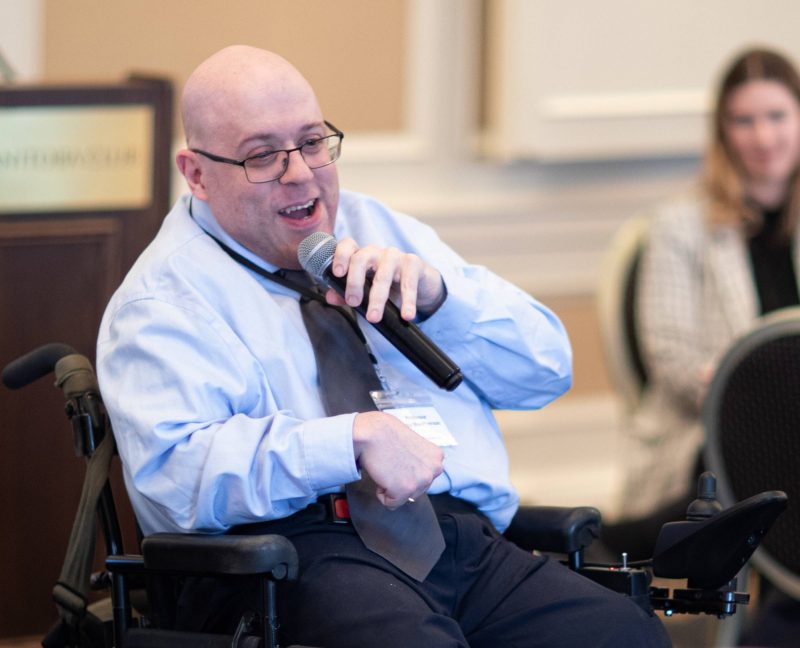
Professor Darcy MacPherson, who initiated the program in 2006, was inspired by his own experiences clerking while in law school at Dalhousie University in Halifax, Nova Scotia. Photo by Mike Latschislaw.
Bueckert gives new students an orientation seminar on how to do research, and together with Justice Mainella, reviews all the cases scheduled for the year and decides which would be appropriate for students to assist with. “I don’t know if we could actually do the program without Melanie,” said Justice Steel, “because afterwards she checks their research so that the judges know they can rely on the research and write their reasons.”
Justice Steel’s interest and dedication to the clerkship program stems from her experience in law school taking part in what was called “The Lawyering Program” taught by Professor Jack London and Hymie Weinstein. “It was the only course I ever had in law school that showed me some aspect of the real practice of law,” said Steel, who graduated from Robson Hall in 1975 before obtaining an LLM from Harvard Law School. “When I came back to be a professor at the Faculty of Law, […] I taught a course called intensive family law, which is a course where, in addition to teaching family law, the students actually worked on real cases, under the supervision of family law lawyers.”
“When I was given the opportunity to supervise third-year students in this context, I grabbed it, because I understood how valuable a program like this could be not only for the students, but for the judges as well. Because the interaction between us gives them a window into what judging is really like and how judges make decisions. Having these young, eager students, asking us questions is just wonderful.” – The Honourable Justice Freda Steel
![Former UM Chancellor Harvey Secter, O.M., C.M., LL.D. [BComm/67, LLB/92], was Dean of Law from 1999 to 2008 and instrumental in starting the collaborative clerkship program with the Manitoba Court of Appeal. Photo by Mike Latschislaw.](https://news.umanitoba.ca/wp-content/uploads/2024/06/Manitoba-Court-of-Appeal-Clerkship-Program_20240510-0573-0008-copy-cropped-681x700.jpeg)
Former UM Chancellor Harvey Secter, O.M., C.M., LL.D. [BComm/67, LLB/92], was Dean of Law from 1999 to 2008 and instrumental in starting the collaborative clerkship program with the Manitoba Court of Appeal. Photo by Mike Latschislaw.
Steel confirmed that the program was “the brainchild of Professor Darcy MacPherson who had experienced something like it in the Maritimes where he came from.” Steel recalled that MacPherson had suggested the idea to Dean Harvey Secter, of starting something similar in Manitoba. “I guess they trusted me to be able to develop this program for the Court of Appeal,” said Steel, who was appointed to the Manitoba Court of Queen’s Bench in 1995 and to the Manitoba Court of Appeal in 2000.
Where are they now?
Clerkship Program alumni attending the lunch were asked to share a photo and brief biography as well as respond to a short survey including questions regarding their biggest career highlight and providing a message for the creators of the Clerkship Program. Responses were impressive with careers ranging from alumni serving as counsel or partners at large Canadian law firms to Crown Attorneys, lecturers or instructors in law, or sole practitioners.
Of the 32 who provided feedback, 10 went on to clerk further after graduation at Federal or other provincial courts across Canada, and at least seven went on to complete graduate studies in law, including one who is currently a lecturer in law in the UK and completing a PhD in Law. Six were Gold Medalists in law in their class.
Some had career highlights ranging from taking a client to see the Backstreet Boys to just plain appearing in the Manitoba Court of Appeal as counsel – and finding the experience enjoyable.
Messages for the Creators of the Clerkship program were immensely positive, including the following:
“Thank you for creating a program that gives students practical experience and insight from the top jurists in the Province. It was an unparalleled experience.” – Terra Welsh [LLB/2007], Partner, Thompson Dorfman Sweatman LLP
“Keep it going. This is a phenomenal opportunity to understand the dynamics of decision making, observe models of advocacy and discuss their efficacy, and connect to potential lifelong mentors.” – Meaghan Daniel [LLB/2008], Meaghan Daniel, Barrister & Solicitor
“My MBCA clerkship was a highlight of my time at Robson Hall. I continue to be so grateful for the opportunity – not just to work on interesting cases and develop my research and analysis skills, but the thoughtful way the program gave us ‘behind the scenes’ access to the judges and staff at the court. It was an invaluable learning experience.” – Dayna Steinfeld [JD/2012], Partner and Winnipeg Lead Lawyer, RavenLaw LLP
“The clerkship program exposed me to how a court actually works to think through legal analysis and produce judgments, which was an important and indelible experience that factored into how I approached the practice and academic study of law. Thank you for making this enriching experience possible.” – Joshua Shaw [JD/2015], Lecturer in Law, University of Kent (Canterbury, UK)
“The Manitoba Court of Appeal clerkship program is invaluable to future legal practitioners. Getting a look at the inner workings of the court and having the opportunity to engage with the judges and assist in the appeal process is an incredible experience. This is particularly so for individuals that are in an early stage of their career. This is the type of program that should be fostered.” – Matthew Norlund [JD/2018], Associate, Taylor McCaffrey
“[The] program was excellent. It was the highlight of my law school experience. It provided unparalleled behind-the-scenes litigation training and taught me the importance of clear, concise written and oral advocacy. The judges and staff were incredibly generous with their time, offering helpful mentorship and practice tips and making me feel as though my research contributions and my opinions were valued and considered. Overall, I could not recommend the clerkship program highly enough to law students.” – Carter Liebzeit [JD/2019], Associate, MLT Aikins LLP
Some choice highlights and memories were shared anonymously including the following gems:
“When I was called to the bar, Justice Hamilton wrote me the nicest letter that anyone has ever written to me. Including my husband.”
“A big thank you to Justice MacInnes for teaching me to never sit in a judge’s office chair (even if Chief Justice Scott expressly gave you permission…)”
As of 2020, the Manitoba Court of Appeal and the Faculty of Law agreed to expand the amount of credit hours to six up from three, with spots available for four third-year law students. “They don’t mind how much work they have to do for the six credit hours,” said Bueckert, describing the work students get assigned.
“[N]ot only do they learn how to do research, but they begin to understand how the judicial system works, what’s important, what’s not important, how judges come to decisions, and therefore, as a lawyer, what would be most persuasive when they appear in front of us,” said Steel. “So, it shows them a slice of what the judicial system is like, which I think is very valuable. Not many lawyers get that.”
One catch to getting into the Clerkship Program is that students in the top 25 per cent GPA are given preference.
Starting in the fall of 2024, the Clerkship Program will officially be offered as an Externship at the Faculty of Law and will be worth 12 credit hours. Applications for Externships typically open in the last week of May, and close in the first week of June.






